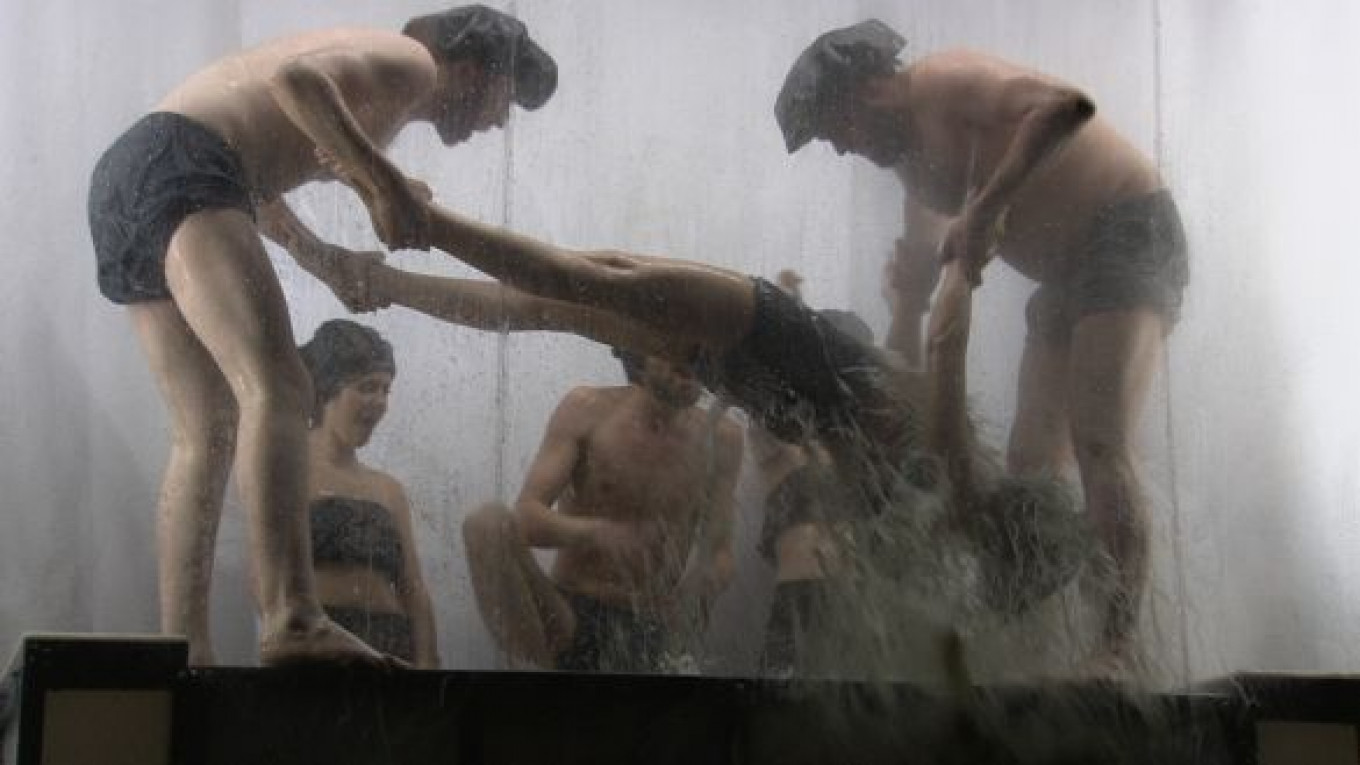Stepping into the hall at A.R.T.O. Theater, you always have the notion you are about to see something that you could not see anywhere else. You suspect that the humor will be dark, the performances fine-tuned, and that you will be challenged from beginning to end.
All of that happens "as expected" in the theater's production of Slawomir Mrozek's "Tango," although little here could be considered expected.
Take something as simple as the seating, whereby, for the first half, every spectator is essentially isolated from others. Chairs stand alone in patterns across the stage, allowing actors to move freely among and around them. For every actor a spectator sees, that same spectator will either voluntarily or involuntarily end up following the reactions of at least a dozen spectators.
Consider also the beginning of the performance.
In the hall occupied by spectators alone, a voice comes down as if from on high. We wonder if it is the director Andrei Kalinin, as the voice explains that the play to be performed does not at all correspond to Mrozek's "Tango," and the theater could have avoided paying the author royalties by not mentioning him. But, says the voice, this really is Mrozek's "Tango."
Before long a body recognizable as being attached to the voice emerges on stage. It is the actor Gleb Ivanov in the guise of a young man named Artur, and he pointlessly, but with great involvement and detail, describes the setting that we ourselves see before us.
Little by little, however, we slip into Mrozek's "Tango," the esoteric parable of a family of rebels who have rebelled so long they have nothing left against which to rebel. This leaves the family's son Artur in a difficult spot. What is a mutinous young man to do when his forebears have utterly exhausted all avenues of mutiny?
In that intellectual and philosophical manner so characteristic of Polish writers, Mrozek does not create what we customarily would think of as "real people." His characters are essays in costumes, symbols embodied or manifestoes with human names. Each represents a differing idea — Artur being the rebel, so to speak, without a cause; his father Stomil (Igor Bulgakov) and mother Eleonora (Yekaterina Yefimova) being the radical bohemians who have always made their lives make sense by breaking all laws and rules; Edik (Artyom Manukyan) being the crude, thoughtless and natural neighbor who is capable of destroying everything.
Ultimately, Artur's only method of rejecting his family heritage is to become a conformist and champion of rigid order. Offended by his mother's open affair with Edik, and by his father's refusal to care, Artur plans to resurrect romantic love with his cousin Alya (Maria Denkova) and have a traditional wedding with all the proper trappings.
But there is a darker side to Artur's choice. At one point, he seeks to convince his father to kill Edik in order to stop his mother's scandalous and offensive behavior.
Ever the rebel, however, Stomil not only refuses to do it, he ends up joining a tryst with the lovers which is beautifully and comically represented in this production as a huge, celebratory orgy in a hot tub involving Artur's grandmother (Yulia Shimolina) and Uncle Yevgeny (Boris Pertsel).
Director Kalinin, working as co-designer with A.R.T.O.'s artistic director Nikolai Roshchin, avoids any hint of realistic visuals in his use of objects and space. Tables and chairs are geometrical shapes cut from aluminum. A mirror is an empty frame through which actors peer at spectators. The function of one prominent vertical contraption is revealed to be a working hangman's scaffold, although no one is harmed by it.
For the wedding, the bride is decked out in a Japanese ceremonial kimono and the groom is resplendent in medieval body armor. It comes in particularly handy when the wedding falls apart and Artur's head encounters a brick wall.
There is something harsh, delicately precise and slightly cold about this production. It is, after all, a post-Apocalyptic play, an exploration of what comes after everything else has already happened.
The cast does a fine job of lending flesh and blood to the unreal characters. Bulgakov, especially, turns in a marvelous scene as his Stomil rambunctiously exhorts his son to throw caution to the winds and break all rules.
"Tango," like anything you will see at A.R.T.O., is not for the casual theatergoer. But if you like theater that takes you to the edge — and sometimes dangles you over it — don't miss this one.
"Tango" plays Friday, Saturday, April 19, 20, 26 and 27 at 8 p.m. at A.R.T.O. Theater, located at 6/1 Sretensky Bulvar. Metro Turgenevskaya. Tel. + 7 495-624-5990. www.artoteatr.com. Running time: 2 hours.
Contact the author at [email protected]
Related articles:
A Message from The Moscow Times:
Dear readers,
We are facing unprecedented challenges. Russia's Prosecutor General's Office has designated The Moscow Times as an "undesirable" organization, criminalizing our work and putting our staff at risk of prosecution. This follows our earlier unjust labeling as a "foreign agent."
These actions are direct attempts to silence independent journalism in Russia. The authorities claim our work "discredits the decisions of the Russian leadership." We see things differently: we strive to provide accurate, unbiased reporting on Russia.
We, the journalists of The Moscow Times, refuse to be silenced. But to continue our work, we need your help.
Your support, no matter how small, makes a world of difference. If you can, please support us monthly starting from just $2. It's quick to set up, and every contribution makes a significant impact.
By supporting The Moscow Times, you're defending open, independent journalism in the face of repression. Thank you for standing with us.
Remind me later.


